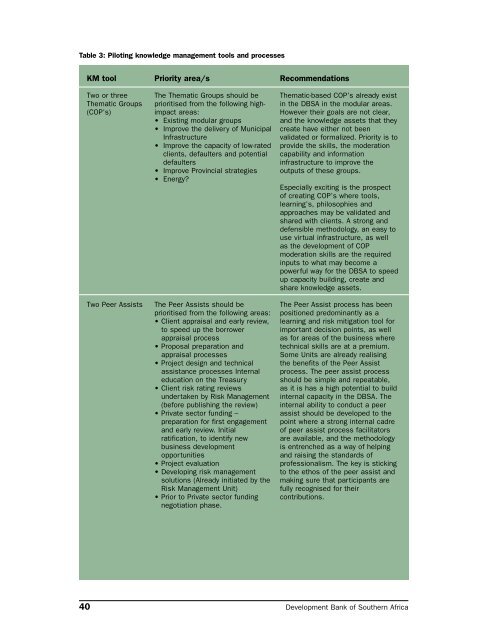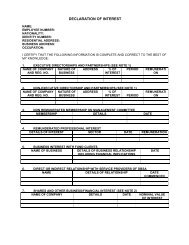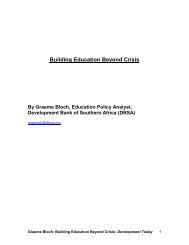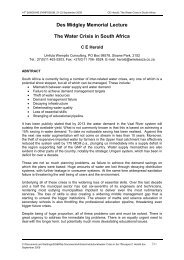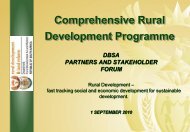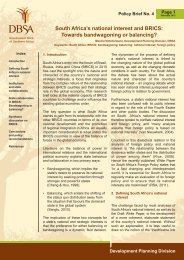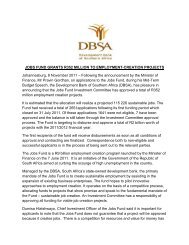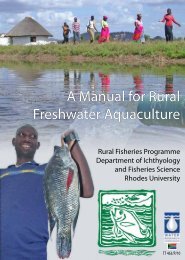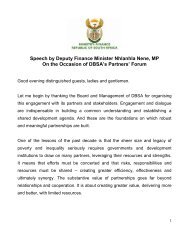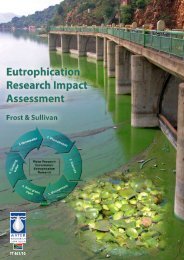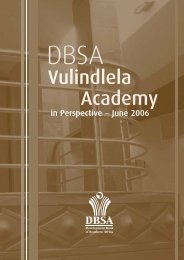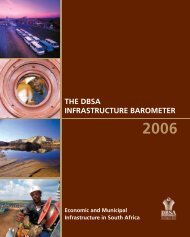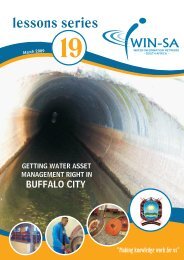A Knowledge Strategy
A Knowledge Strategy
A Knowledge Strategy
You also want an ePaper? Increase the reach of your titles
YUMPU automatically turns print PDFs into web optimized ePapers that Google loves.
Table 3: Piloting knowledge management tools and processes<br />
KM tool<br />
Two or three<br />
Thematic Groups<br />
(COP’s)<br />
Two Peer Assists<br />
Priority area/s<br />
The Thematic Groups should be<br />
prioritised from the following highimpact<br />
areas:<br />
• Existing modular groups<br />
• Improve the delivery of Municipal<br />
Infrastructure<br />
• Improve the capacity of low-rated<br />
clients, defaulters and potential<br />
defaulters<br />
• Improve Provincial strategies<br />
• Energy?<br />
The Peer Assists should be<br />
prioritised from the following areas:<br />
• Client appraisal and early review,<br />
to speed up the borrower<br />
appraisal process<br />
• Proposal preparation and<br />
appraisal processes<br />
• Project design and technical<br />
assistance processes Internal<br />
education on the Treasury<br />
• Client risk rating reviews<br />
undertaken by Risk Management<br />
(before publishing the review)<br />
• Private sector funding –<br />
preparation for first engagement<br />
and early review. Initial<br />
ratification, to identify new<br />
business development<br />
opportunities<br />
• Project evaluation<br />
• Developing risk management<br />
solutions (Already initiated by the<br />
Risk Management Unit)<br />
• Prior to Private sector funding<br />
negotiation phase.<br />
Recommendations<br />
Thematic-based COP’s already exist<br />
in the DBSA in the modular areas.<br />
However their goals are not clear,<br />
and the knowledge assets that they<br />
create have either not been<br />
validated or formalized. Priority is to<br />
provide the skills, the moderation<br />
capability and information<br />
infrastructure to improve the<br />
outputs of these groups.<br />
Especially exciting is the prospect<br />
of creating COP’s where tools,<br />
learning’s, philosophies and<br />
approaches may be validated and<br />
shared with clients. A strong and<br />
defensible methodology, an easy to<br />
use virtual infrastructure, as well<br />
as the development of COP<br />
moderation skills are the required<br />
inputs to what may become a<br />
powerful way for the DBSA to speed<br />
up capacity building, create and<br />
share knowledge assets.<br />
The Peer Assist process has been<br />
positioned predominantly as a<br />
learning and risk mitigation tool for<br />
important decision points, as well<br />
as for areas of the business where<br />
technical skills are at a premium.<br />
Some Units are already realising<br />
the benefits of the Peer Assist<br />
process. The peer assist process<br />
should be simple and repeatable,<br />
as it is has a high potential to build<br />
internal capacity in the DBSA. The<br />
internal ability to conduct a peer<br />
assist should be developed to the<br />
point where a strong internal cadre<br />
of peer assist process facilitators<br />
are available, and the methodology<br />
is entrenched as a way of helping<br />
and raising the standards of<br />
professionalism. The key is sticking<br />
to the ethos of the peer assist and<br />
making sure that participants are<br />
fully recognised for their<br />
contributions.<br />
40 Development Bank of Southern Africa


